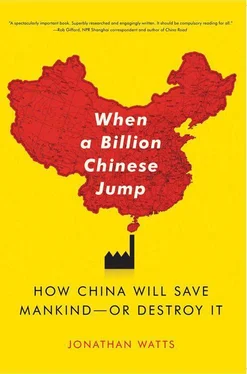Julian had arrived in Shanghai as a student eight years earlier with just 5,000 yuan in his pocket. Now, he had an Omega watch worth six times that amount on his wrist and wore Zegna shoes and a Hugo Boss suit that he could never have afforded in the past. “My life here is better than in France. I have a big apartment, a cleaner, a compound with a pool and a gym. It is so comfortable, it is almost too much. I am very happy.”
He saw a similar change in the city. There were more Ferraris and Porsches than in the past. There was a wider choice of restaurants than in Paris. The supermarkets contained the finest food and drink from around the world, albeit at more than twice the price it would be in Europe. The change was accelerating. “What they did before in ten years, they now do in two. All of the world’s big brands are opening stores in Shanghai. There are so many customers here.”
Most of the revelers in his lounge were Europeans. The disparity between expats and locals was even more pronounced on the Bar Rouge terrace on the sixth floor, where mostly foreign partygoers drank and danced to techno music, bathed in blue neon light under a fluttering red Chinese flag. They were marketing agents, corporate managers, language teachers, and others in the vanguard of global consumer culture. There were some stylish locals too, but most of the Chinese appeared to be girls paid to dance on the tables, keep the mood suitably scandalous, and encourage the expat customers to buy rounds of shots served in test tubes.
“Where can I meet Chinese partygoers?” I asked Emily.
She was reluctant to recommend anywhere: “There are clubs, but they are the type of place you would find in a second-tier city. The music and décor are not as good, but Chinese men prefer them because they don’t want to be near foreigners. Chinese women are different. They are more open. They go where the quality is.”
I left alone. Outside the building, a weary-looking hooker touted for business and a dealer offered cocaine for 1,000 yuan per gram. Wandering bars and restaurants, I met a man who claimed to be one of the city’s earliest nightclub owners. He claimed to be halfway toward his ambition of licking the nipples of 10,000 women. From others, I learned how bar owners had to pay off the police by taking out a subscription to the monthly public security magazine costing more than 20,000 yuan ($2,857) a copy. They organized prostitutes for their customers and trips to karaoke parlors where hostesses stripped off to sing, and to the saunas on Wuzonglu where masseuses used their soaped naked bodies to wash clients. Shanghai was emulating the consumer sex industry of Tokyo.
There were other reminders of Japan at the height of its “bubble economy.” During the peak of its excess in the late eighties, the most notorious binge spending and clubbing took place at a club called Juliana’s, where microskirted wan-ren-bodi-kon-gyaru (one-length hair, body-conscious girls) would dance on bars as the clientele splashed out thousands of dollars on champagne and whiskey. Now, the same vibe pulsated through China’s commercial heartland. While 1980s Tokyo had Juliana’s, twenty-first-century Shanghai had Club 88. When I got there at 3 a.m., the club was heaving with scantily clad bodies. A beautiful Asian woman wandered through the throng in fishnet stockings, a garter belt, miniskirt, and skimpy top, casting her blue-contact-lensed eyes toward the ceiling as a drunken girl toppled off the platform where she had been dancing. The tables were packed. On a stage by the bar, a would-be pop idol lip-synched to Michael Jackson surrounded by busty hookers, svelte socialites, shabbily dressed Europeans, and a couple playing Jenga. The barmen juggled spirit bottles between serving cocktails. Waiters whisked by carrying bottles of champagne in buckets of ice decorated with fizzling fireworks. Faux French chandeliers pulsated in time with the music. Clouds of dry ice billowed up from below the stage. Amid the smoke and the music and the money, Shanghai was having a ball.
The next day, Emily helped me climb farther up the social ladder with an introduction to the head of a thriving marketing agency.
Cindy Tai was a former head of EMI Music in China who had helped to organize the first Rolling Stones concert in Shanghai. Perhaps for this reason, she spoke the language of pop altruism. In near flawless English she told me how her values were changing.
“We must focus on inner beauty, not the luxury outside. If we can all save on what we consume, then we can feed the starving people.”
When she was a child, Cindy had a yang wawa made of cloth. She had had to nag her mother endlessly to buy it. Even in Shanghai, luxuries like dolls were frowned upon in the postrevolution era. Although it was cheap and ugly, Cindy used scraps of material, spare yarn, glass beads, and colored paper to make it look beautiful, which, even then, meant Western. “My doll had big blue eyes. I painted them myself. And I gave her fake blond hair. We tried to make our dolls look Western because the West was rich, while China was poor.”
The doll was confiscated by Red Guards, along with her mum’s high heels, soon after the Cultural Revolution began. The only playthings allowed were revolutionary dolls in Mao suits. Cindy and her academic parents were sent to a farm on the nearby island of Chongming, where she turned her musical talent to playing revolutionary songs. “We had enough to eat but nothing to spare. We were very happy if we got a little meat on the table once a week. My parents suffered at that time. I vowed that one day I would buy them whatever they wanted.”
That was easy for her now, but, after I told her I was writing a book about the environment, she insisted she had grown out of materialist ambitions.
“My dream now is to create an organic farm. I would like to grow fruit, vegetables, and rice, to raise pigs and chickens. And to have a helicopter to drive me around because the traffic is so bad.”
Like many affluent consumers around the world, her idea of environmentalism seemed to be choosing what was healthy for her rather than for the planet. She had blueberries delivered from the local organic farm, baguettes from a French bakery in Xintiandi, and olive oil from Italy. She dined out at least once a day.
Cindy was conflicted by the competing pressures to be green and to be seen. She had recently been thinking of buying a Porsche. After sales agents took her out for a spin on Shanghai’s F1 racetrack, she initially put in an order for a 1-million-yuan black Porsche. “It’s a novelty thing. Everyone had one, so I felt I had to get one to keep up with the Joneses.”
But she said she was having second thoughts. “We keep to a minimum because we want to be green and environmentally friendly. We are very conscious of the environment. We are trying to save the earth so we should not produce a lot of waste. I am very concerned. Everyone is talking about global warming.”
At one point she and her French husband had four cars: a BMW, an MG, and a couple of Mercedes-Benzes. Now they had only two, a sign, she said, of their increased concern for the planet. Later in the conversation she revealed her interest had switched to yachts. One was moored near their second home in Cannes. Another was being built.
She may yet get another luxury car. Cindy was already a member of the Shanghai Porsche Club, mainly to keep up with her friends. She checked her mobile phone for a text message about the next event, a cocktail party and awards ceremony hosted by Jaguar and the style magazine Modern Weekly .
“They insist I go. I guess they want all the posh people there,” she said. Sensing a social-climbing opportunity, I shamelessly asked if I could attend. Her manners were far too good to refuse.
Читать дальше










